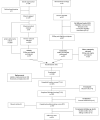The Efficacy of a Smartphone Game to Prevent HIV Among Young Africans: Protocol for a Randomized Controlled Trial in the Context of COVID-19
- PMID: 35030090
- PMCID: PMC8896564
- DOI: 10.2196/35117
The Efficacy of a Smartphone Game to Prevent HIV Among Young Africans: Protocol for a Randomized Controlled Trial in the Context of COVID-19
Abstract
Background: Adolescents contribute slightly less than one-third of all new HIV infections in sub-Saharan Africa. There is a need for more effective intervention approaches to help young adolescents safely navigate through adolescence and into adulthood. We are assessing the efficacy of Tumaini, a smartphone game designed to prevent HIV among young Africans. Against the background of COVID-19, meaningful alteration of the research protocol was necessary to ensure successful implementation and retention of the study participants in ongoing research.
Objective: The objective of our protocol is to determine (1) if Tumaini delays sexual debut and increases condom use at first sex and (2) whether it influences behavioral mediators of early and unprotected sex.
Methods: Participants were recruited from Kisumu County in Western Kenya. This study is a 2-arm, individual-randomized controlled trial that enrolled 1004 adolescents aged between 12 years and 15 years. The intervention arm participants are playing Tumaini, while the control arm is provided with Brainilis, a commercially available control game. The study period will last 45 months. At baseline, participants in both arms completed a baseline survey and biological testing for HIV and herpes simplex virus, type 2 (HSV-2); participants will have annual game play periods in years 1-3. They will also complete a total of 12 follow-up surveys. At endline, repeat biological testing will be conducted. Protocol adaptations were necessitated by the COVID-19 pandemic and implemented in accordance with local public health guidelines.
Results: Participants were enrolled between October 2020 and November 2020. We plan to complete study procedures in September 2024. The enrolled participant sample was 50.1% (499/996) female and had a mean age of 14.0 (SD 0.6) years.
Conclusions: This ongoing research demonstrates that, with appropriate revisions to planned protocol activities guided by the need to maintain study integrity, protect both study participants and staff, and adhere to institutional review board and local health authority guidelines, human subject research is possible in the context of a global pandemic. If the trial demonstrates efficacy, Tumaini would provide an alternative, remote means of delivering age-appropriate education to adolescents on safer sex, HIV prevention, and effective life skills on a highly scalable, low-cost, and culturally adaptable platform.
Trial registration: ClinicalTrials.gov NCT04437667; https://clinicaltrials.gov/ct2/show/NCT04437667.
International registered report identifier (irrid): DERR1-10.2196/35117.
Keywords: Africa; COVID-19; HIV; Kenya; adolescent; efficacy; game for health; gaming; mHealth; prevention; randomized controlled trial; serious game; smartphone; teenager; young Africans; young adult.
©Victor Mudhune, Gaëlle Sabben, Ken Ondenge, Calvin Mbeda, Marissa Morales, Robert H Lyles, Judith Arego, Richard Ndivo, Robert A Bednarczyk, Kelli Komro, Kate Winskell. Originally published in JMIR Research Protocols (https://www.researchprotocols.org), 03.03.2022.
Conflict of interest statement
Conflicts of Interest: None declared.
Figures
References
-
- HIV AIDS statistics - 2019 fact sheet. UNAIDS. 2019. [2022-02-20]. https://www.unaids.org/sites/default/files/media_asset/2019-UNAIDS-data_... .
-
- Fast-Track - Ending the AIDS epidemic by 2030. UNAIDS. 2014. Nov 18, [2022-02-20]. https://www.unaids.org/en/resources/documents/2014/JC2686_WAD2014report .
-
- 2020 Global AIDS Update — Seizing the moment — Tackling entrenched inequalities to end epidemics. UNAIDS. 2020. Jul 06, [2022-02-20]. https://www.unaids.org/en/resources/documents/2020/global-aids-report .
-
- Kenya HIV Estimates: Report 2018. National AIDS Control Council. 2018. [2022-02-20]. https://nacc.or.ke/wp-content/uploads/2018/11/HIV-estimates-report-Kenya... .
Associated data
Grants and funding
LinkOut - more resources
Full Text Sources
Medical



